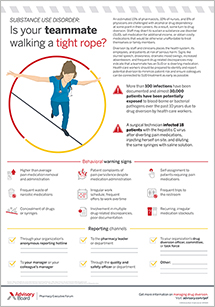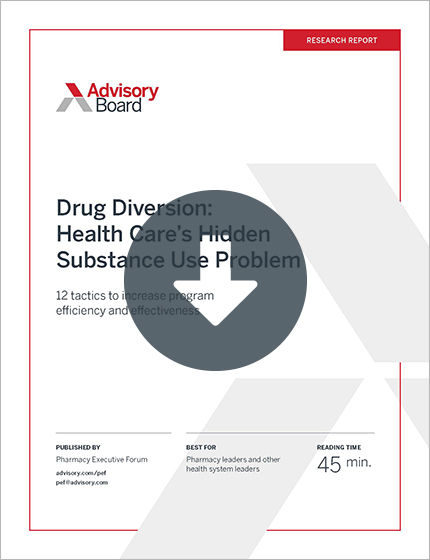Auto logout in seconds.
Continue LogoutEditor's note: This popular story from the Daily Briefing's archives was republished on Oct. 10, 2019.
Read Advisory Board's take: How your organization can address drug diversion
Tiffany Swedeen nearly lost her job as a nurse after she was discovered stealing opioids from her hospital. Now, years after going through recovery, she's back at work—and hoping to serve as an example for other health care professionals struggling with addiction.
A common problem in nursing
Approximately one in 10 nurses has a substance use disorder, Swedeen writes.
"Nurses readily encourage drinking as a coping skill, use of anti-anxiety medicine is socially approved of, and sleeping pills are shared between friends," she writes. However, Swedeen writes, "admitting one has lost control of one or more of these highly addictive substances is absolutely taboo."
Nurses also often "feel invincible as [the] caregivers," Swedeen writes, and their knowledge of medications and how to "safely" use them "gives [them] a false sense of security." In addition, Swedeen suggests that a disproportionate number of nurses and others in caregiving professions may have parents who are alcoholics, meaning they're "essentially predisposed" to the disease "and then enter into a pressure cooker of a career," Swedeen writes.
Swedeen's story
Swedeen writes that, eight years into her career as a nurse, she "became physically and psychologically dependent on Vicodin." She suffered from migraines that interfered with her job and her ability to parent her children.
After a doctor prescribed an opiate, Swedeen "experienced blissful relief as the migraine melted away and euphoric energy filled the void," she writes.
But Swedeen became more tolerant to the medication, so to obtain more, she starting stealing from the hospital, she writes. "Compulsion to use and desperation to avoid withdrawal won over any rational thought process," Swedeen explains.
Swedeen writes that once she had realized she had crossed the line "from medical and occasional recreational use to abuse and dependence," she "felt trapped." She writes, "I couldn't just tell my manager. I couldn't even tell a friend. Too much was at stake."
Swedeen felt "[i]mprisoned" by her addiction. She refused to attend support group meetings out of fear of being recognized. Swedeen eventually contacted a private counselor, but the counselor declined to treat her because there was "[t]oo much liability" associated with Swedeen's profession, she writes.
Swedeen's "rock bottom" came when a coworker reported her behavior, she writes. She was required to give a urine sample, and when it came back positive for drugs, she was given a choice: enter into treatment or potentially lose her nursing license.
"I made my way to treatment; sick with shame and certain I'd destroyed my reputation, my dignity, and life as I knew it," Swedeen writes.
But her outlook started changing as she spent more time in treatment. "One month of sobriety turned into multiple, and the chemical fog began to clear," she writes.
Where Swedeen is now
Swedeen writes that she returned to her job as a nurse after two-and-a-half years in recovery. Since her return, she has been working in lower-acuity areas of the hospital, and is trying to work her way back to the critical care unit where she used to work. Swedeen writes that she was "met with hugs and a welcoming atmosphere" when she returned to the hospital, and felt a "lightness [she had] not felt in a long time at work."
But Swedeen writes that she now has a new mission at work. "I hope to give back more than I have ever taken. To tip the karmic scales by showing up every day honest and willing," she writes. "And for all health care professionals that have or are suffering from the shame addiction has caused in their lives—I hope to prove recovery is possible" (Swedeen, The Fix, 5/27; Swedeen, ScrubbedCleanRN, 1/26).
Advisory Board's take

Rebecca Tyrrell, Practice Manager, Pharmacy Executive Forum and Alex Polyak, Analyst, International Research
Tiffany's story is a powerful one and shines light on an issue that has long been hidden. Far more than other professions, health care workers are at an increased risk of diverting drugs given their high-stress work environment and access to medications on a daily basis.
An estimated 15% of pharmacists, 10% of nurses, and 8% of physicians are challenged with alcohol or drug dependency at some point in their careers—yet many hospitals only report a handful of diversion incidents per year, leaving a vast number unreported and unresolved.
Frontline staff can be the organization's first line of defense in identifying potential drug diversion, but all too often employees fail to report suspicious activity. We see two main reasons why:
- Employees may be unaware that diversion is likely occurring at their institution (and therefore don't know to be aware of it); and
- Staff may think that reporting diversion automatically results in their colleague's termination.
Health systems must dispel these misconceptions by first acknowledging that diversion occurs at every hospital and impacts staff indiscriminate of performance or tenure. Staff need to learn about common methods of diversion, who is likely to divert and why, how to recognize diversion, and how to report suspicious activity. Next, leaders should raise awareness about how the organization supports employees by connecting them to substance use disorder treatment when possible.
“Increasingly, hospitals are adopting no-fault rehabilitation programs”
Increasingly, hospitals are adopting no-fault rehabilitation programs to encourage reporting, to provide the necessary treatment and support to staff in need, and to offer a pathway to reintegration into the hospital's workforce. As part of these programs, staff are typically assigned to an HR specialist following completion of a detox and drug rehabilitation program. The specialist oversees the staff member's reintegration into the hospital workplace, which starts with 2-3 years in a non-clinical role. After that time, compliant staff can be considered for re-integration into a clinical position. Rising turnover costs make this policy financially valuable; the cost of rehabilitation and reintegration is typically less expensive than the capital and institutional costs of termination and hiring. While some staff opt to leave the profession, most programs report nearly universal rehabilitation completion rates.
To learn more about behavioral warning signs for substance use disorder, and to get a poster you can hang up to raise awareness in your hospital or health system, download our new infographic: Is your teammate walking a tight rope?
Don't miss out on the latest Advisory Board insights
Create your free account to access 1 resource, including the latest research and webinars.
Want access without creating an account?
You have 1 free members-only resource remaining this month.
1 free members-only resources remaining
1 free members-only resources remaining
You've reached your limit of free insights
Become a member to access all of Advisory Board's resources, events, and experts
Never miss out on the latest innovative health care content tailored to you.
Benefits include:
You've reached your limit of free insights
Become a member to access all of Advisory Board's resources, events, and experts
Never miss out on the latest innovative health care content tailored to you.
Benefits include:
This content is available through your Curated Research partnership with Advisory Board. Click on ‘view this resource’ to read the full piece
Email ask@advisory.com to learn more
Click on ‘Become a Member’ to learn about the benefits of a Full-Access partnership with Advisory Board
Never miss out on the latest innovative health care content tailored to you.
Benefits Include:
This is for members only. Learn more.
Click on ‘Become a Member’ to learn about the benefits of a Full-Access partnership with Advisory Board
Never miss out on the latest innovative health care content tailored to you.


